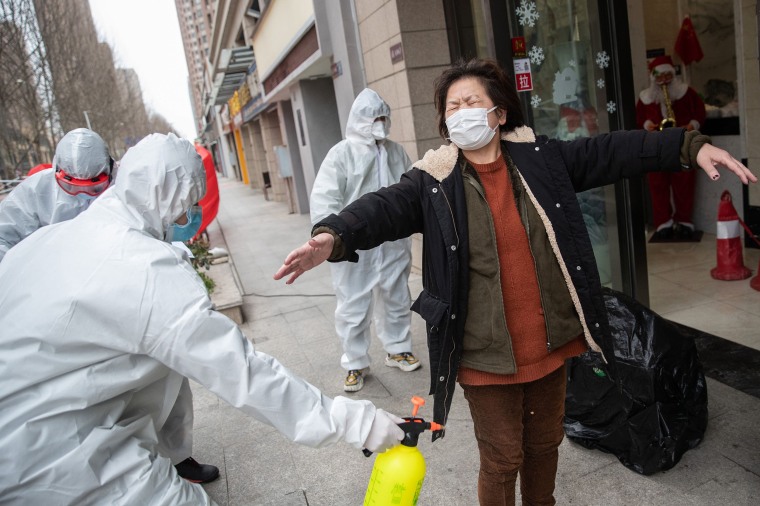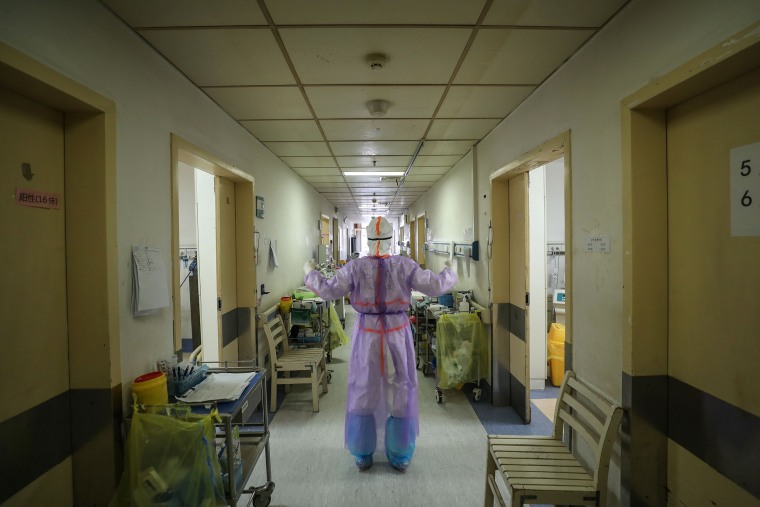The new coronavirus has presented perhaps the biggest challenge to the Chinese government in a generation, posing a test not seen before by its strongman president, Xi Jinping.
Now it appears Chinese officials are trying to change the narrative.
The exact origin of the virus — which has sickened close to 100,000 people worldwide and killed close to 3,500 as of Friday — has not been confirmed. But it is believed to have been transferred to humans at a market in the central Chinese city of Wuhan, where the pathogen first broke out.
In recent weeks, however, Chinese officials have appeared eager to float the idea that the virus did not necessarily start in their country at all.
"No conclusion has been reached yet on the origin of the virus," Zhao Lijian, the Chinese foreign ministry spokesman, told a briefing Thursday.
He referred to a statement by Dr. Zhong Nanshan, a prominent epidemiologist, who claimed last month that "though the virus was first discovered in China, it may not have originated" there.
Zhong did not give an alternative suggestions about how this all started, but his words have fueled a raft of conspiracy theories online, including that the contagion might have been brought in by American athletes staying in Wuhan during the Military World Games last year.
Though these posts have been read by millions of people on Chinese social media sites, and been challenged by many of the same readers, that's not the most surprising thing about them, according to Steve Tsang, professor at the China Institute at London's SOAS university.
What's interesting, he said, is that the posts have not been removed by China's strict internet censors, who regularly scrub out any conversation or topic that they do not want to spread.
This suggests that these conspiracy theories — perhaps more through accident than design — chime neatly with the distractive goals of the Chinese government.
"We know the Chinese government censor both the traditional media and the social media very, very tightly," Tsang said. "And practically nothing that the Chinese government terms unacceptable will be allowed to stay for any period of time. So if something stays, it's because it has been allowed to stay."
He added, "Nothing is left up there by accident, at least not for long."

China is of course far from the only country whose social media users — not to mention elected officials — are promoting unsubstantiated claims about the deadly outbreak.
In the United States, President Donald Trump has called the coronavirus a "hoax," and Sen. Tom Cotton, R-Ark., has promoted a fringe theory that the virus was linked to a laboratory in Wuhan, something he has since walked back.
Meanwhile on social media sites such as Facebook, Twitter and YouTube, all of which are banned in China, conspiracy theories have racked up tens of millions of views and have been among the most popular results under certain search terms.
It's also true that many people posting about conspiracy theories in China are doing so to debunk the claims.
On one of China's most popular social media tools, WeChat, where many people access information about the virus, a quick search of "Coronavirus is from the U.S." yields mostly articles explaining why such claims are unreasonable. Some pointed out such fear or misinformation simply comes from mistranslated U.S. news headlines.
Still, though the virus has now moved far beyond China's borders, the ramifications for the world's most populous country and second-largest economy are still far from over.
International experts have heavily criticized the Chinese government and local officials for not releasing more information about the virus in its early stages — with some alleging there was a deliberate cover up. One doctor who tried to warn officials about the impending epidemic was reprimanded by police, only to later die from it himself.
Anger was palpable on China's heavily restricted social media sites. Many avoided banned words, instead using thinly veiled references to Chernobyl, the nuclear meltdown in Ukraine in 1986 that was initially covered up by the Soviet Union, and quotes from the French revolutionary novel "Les Miserables."
Most notably, a prominent Chinese law professor, Xu Zhangrun, wrote an essay saying the virus had "revealed the rotten core of Chinese governance," and that "groundless decisions from authorities have pushed powerless citizens to despair and the disease to the globe."
Although China's first wave of infections appears to be at an ebb, there are now fears about other countries bringing the coronavirus back in and triggering a second wave. Several cities have announced a two-week quarantine for anyone arriving from places like Iran and Italy.
Nevertheless, from a messaging perspective at least, China's efforts have been "amazingly successful in terms of propaganda," according to Tsang at SOAS.
"It depends on your yardstick. If it's about controlling the narrative, which is what Xi Jinping uses, then they are very successful," he said. "If your yardstick is about containing the virus and preventing it from spreading, then it's not."

